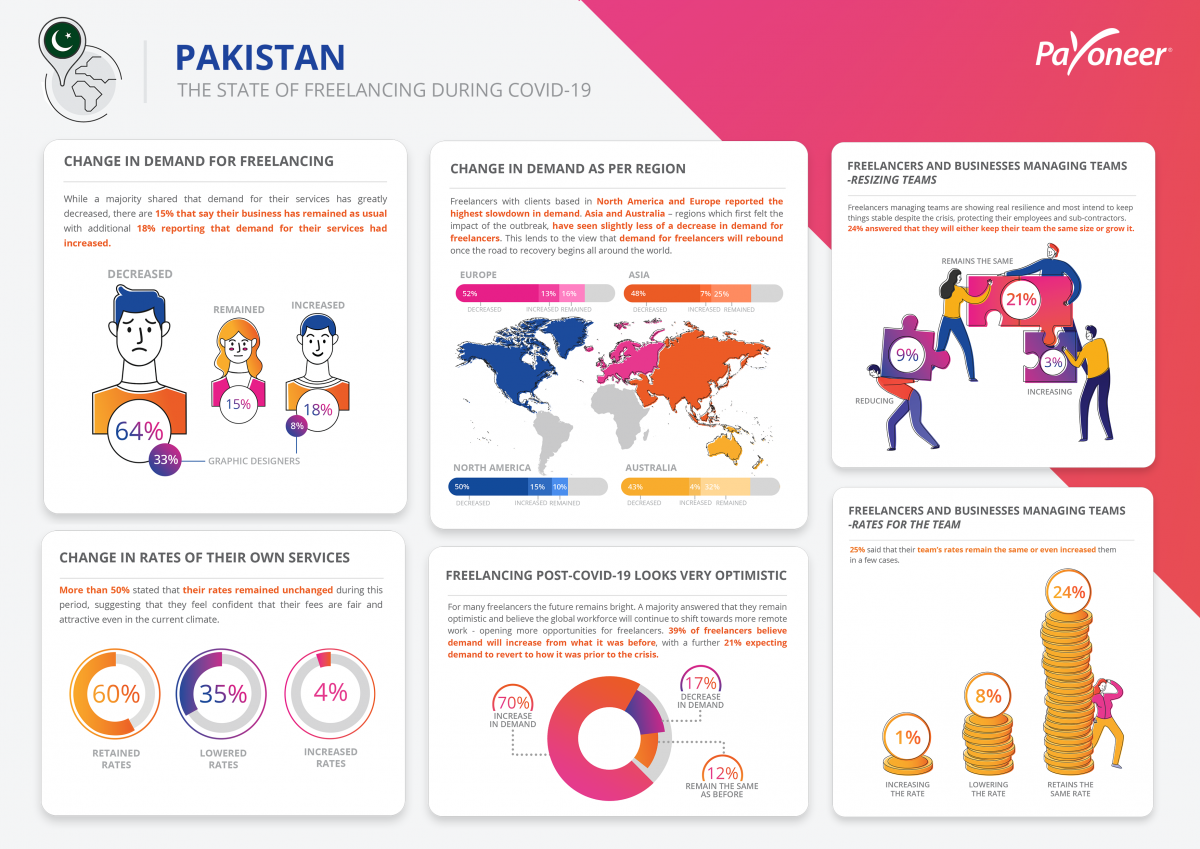
Payoneer released its Freelancing During Covid-19 Report based on a survey of over 1,000 freelancers from more than 100 countries, providing insights on the impact of COVID-19 on the economic outlook for freelance services and how it will shape business practices after. The report illustrates a resilient workforce that maintains its optimism as it anticipates an improved long-term future. Freelancing may become the new norm very quickly as companies seek specialized skill sets that will help them overcome challenges posed by the global pandemic.
The diversity of talent and skills make freelancers an attractive option for businesses; they no longer face the limitations required to address their business needs, especially when the current economic outlook is full of uncertainty. In addition, freelancers offer more flexibility, giving businesses the ability to grow without taking on extra fixed costs.
“Payoneer surveyed more than a thousand freelancers and found that 53% believe demand for their services will increase once the pandemic is over. There’s already been rapid growth in new freelancers entering marketplaces. Much like the downturn in 2008 where we saw a freelancer surge that many called the ‘industrial revolution of our time,’ companies will start to rebound and rebuild as the reopening of the economy begins,” said Scott Galit, CEO, Payoneer. “However, the skills in demand may differ from what they were pre-crisis. Companies will be looking to run leaner and to do this, they’ll need to fill skill gaps they weren’t expecting. Freelancers will come from a wide range of backgrounds and will need to demonstrate their value as individual contributors. Industries where we’re already seeing demand increase, include web and graphic design, content writing, and marketing.”
The report shares highlight the current state of freelancing and what might expect in the future, including:
Freelancing rates remain stable despite the slowdown
According to our recent 2020 Freelancer Income Report, the worldwide average hourly rate charged by freelancers stood at $21/hour, higher than the $19/hour average when the last survey was done two years earlier. We asked freelancers if they have made any changes to the rates that they charge due to the pandemic. A clear majority of freelancers mentioned that their rates have remained the same (77%) or even gone up.
The future of freelancing is optimistic but will be more competitive
In Pakistan, 82% of freelancers believe that demand will increase after Covid-19. They also see tighter competition ahead as more workers are making the switch to freelancing, with 64% stating that their rates remained unchanged or even increased during this period, suggesting that they feel confident that their fees are fair and attractive even in the current climate. Those with a strong portfolio of projects previously completed and an impressive set of reviews on the freelance marketplaces are in the best position to capitalize when demand increases again.
Ayman Sarosh, Freelancer of the Year 2019 and Founder of WEcan, from Pakistan talks about how freelancers must be able to take advantage of opportunities that arise from the situation: “Currently businesses are moving online and freelancers have a tremendous opportunity, both in web/app development and digital marketing to help grow their businesses. I have seen quite a few freelancers who have been very active not only on job portals but also on other social media channels, extending their expertise to help and advertise their services. The current situation seems to be providing an equal chance to opportunities and new online ventures that were never considered viable before.”
Freelancers are already experts in working remotely, communicating effectively from afar, and offering businesses the flexibility to scale on demand. While demand for freelancers appears to have slowed in the short term, many believe that it is just a matter of time until businesses get back on their feet and turn to outsource in order to acquire quality talent. This is also resonated in the numbers for Pakistan where a majority shared that demand for their services has greatly decreased, there were 33% that said their business has remained as usual with most of them reporting that demand for their services had increased.
“The future of work is here. As the world figures its way out of the crisis, it’s clear that while some things will go back to how they were before others, others will be changed forever,” said Jonny Steel, VP Marketing, Payoneer. “It is our belief that businesses worldwide will continue heading towards a more fluid workforce, connecting with skilled talent at home and abroad, in the realization that today’s world is borderless in more ways than we perhaps ever imagined.”










